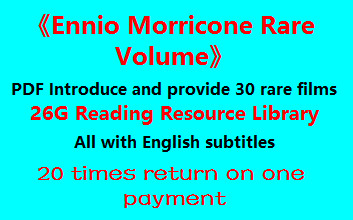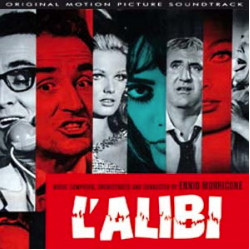L’ALIBI (1968)
L’Alibi is an Italian comedy written by, directed by, and starring Adolfo Celi and Vittorio Gassman. It’s a story of societal one-upmanship, bitterness, and jealousy, laced with dark humor, and sees Celi and Gassman meeting up with another old friend (Luciano Lucignani) who has been out of the country for 15 years. As they reveal their mutual histories to each other, having been apart for so long, the three ‘friends’ criticize one another on their achievements, or lack thereof, and begin to re-evaluate their lives.
The score is one of Morricone’s lively 1960s pop scores, most of which is based around several light, breezy, jazzy arrangements of a recurring main theme, naturally called “L’Alibi”. The five ‘shake’ versions of the theme are effortlessly groovy, and often feature Hammond organs and electric guitars backed by a choir, rocking and dancing to the beat, while others are arranged like a samba, an ‘interludio romantico,’ or a ‘marcetta grotesca’.
Others pieces embrace a different light pop/lounge jazz style that is infectious as it is so much of its era. “Immagini del Tempo,” for example, has an unmistakable bossa nova style which Morricone blends with very classical orchestrations for strings, harpsichord, and doo-doo voices. In the various versions of “Belinda May” the choir croons the name of the girl in the title. “Canzone Della Libertà” is an unusual but superbly memorable song performed by the legendary vocalist Sergio Endrigo and I Cantori Moderni di Alessandro Alessandroni, which includes snippets from famous speeches about freedom, and has a bouncy brass-led refrain. “Sognando” even brings out the whistlers.
A few cues do break the mold; “Pennellate” uses harpsichord, strings, and percussion in decidedly unconventional ways to make for an uneasy 2 minutes of listening. Similarly, “Guardando Nel Vuoto” is an off-kilter suspense piece, spiky and agitated, using the same orchestrations as the earlier cue to throw the listener off-balance. “Delicatamente” is a pretty, fragile duet for harpsichord and piano, while “Lo Libero” is an unsettling combination of rumbling timpanis and high, agitated string sustains. Most unusually, “Animaletti” is a tribal piece for electric guitars and jungle drums, with a vocalist repeating the phrase ‘tookoo tookoo tookoo’ over and over again! It’s all very interesting, how it all comes together.
Like all Morricone scores, L’Alibi appears to have been released approximately 19 times over the years by various different labels. This version, released by Dagored in 2007, includes virtually the complete score, plus various bonus cues and alternates. It’s a fun score if you like Morricone’s kitschy catchy Europop style, but others from this time period are more essential.
Track Listing: 1. Immagini del Tempo (2:26), 2. Belinda May (2:57), 3. Canzone Della Libertà (3:04), 4. Allegretto Burlesco (1:43), 5. Pennellate (2:00), 6. L’Alibi (Shake N.1) (2:54), 7. Guardando Nel Vuoto (3:44), 8. Delicatamente (1:08), 9. L’Alibi (Samba) (2:23), 10. Sognando (1:51), 11. Lo Libero (2:10), 12. L’Alibi (Shake N.2) (1:59), 13. Animaletti (1:39), 14. Belinda May (Versione 2) (1:24), 15. Recitazione Corale (1:20), 16. L’Alibi (Samba) (1:11), 17. Una Fotografia (0:52), 18. L’Alibi (Shake N.3) (2:20), 19. In Un Filo d’Erba (2:07), 20. Belinda May (Versione 3) (2:02), 21. L’Alibi (Interludio Romantico) (0:46), 22. L’Alibi (Marcetta Grotesca) (1:18), 23. Immagini del Tempo (Versione 2) (0:56), 24. L’Alibi (Shake N.4) (1:23), 25. Belinda May (Versione 4) (2:55), 26. Una Fotografia (2:34), 27. Canzone Della Libertà (Off Vocal Version) (3:10). Dagored RED-178, 54 minutes 16 seconds.












